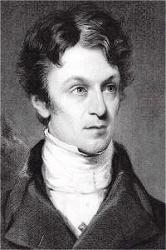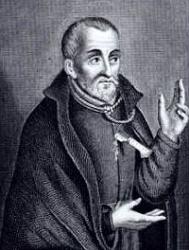Planning worship?
Check out our sister site, ZeteoSearch.org,
for 20+ additional resources related to your search.
- |
User Links
Person Results
John Bacchus Dykes

1823 - 1876 Person Name: J. B. Dykes, Mus. Doc. Composer of "ST. CROSS" in Worship Song As a young child John Bacchus Dykes (b. Kingston-upon-Hull' England, 1823; d. Ticehurst, Sussex, England, 1876) took violin and piano lessons. At the age of ten he became the organist of St. John's in Hull, where his grandfather was vicar. After receiving a classics degree from St. Catherine College, Cambridge, England, he was ordained in the Church of England in 1847. In 1849 he became the precentor and choir director at Durham Cathedral, where he introduced reforms in the choir by insisting on consistent attendance, increasing rehearsals, and initiating music festivals. He served the parish of St. Oswald in Durham from 1862 until the year of his death. To the chagrin of his bishop, Dykes favored the high church practices associated with the Oxford Movement (choir robes, incense, and the like). A number of his three hundred hymn tunes are still respected as durable examples of Victorian hymnody. Most of his tunes were first published in Chope's Congregational Hymn and Tune Book (1857) and in early editions of the famous British hymnal, Hymns Ancient and Modern.
Bert Polman
John Bacchus Dykes
Anonymous
Author of "A voice upon the midnight air" in A Collection of Hymns, for the Christian Church and Home In some hymnals, the editors noted that a hymn's author is unknown to them, and so this artificial "person" entry is used to reflect that fact. Obviously, the hymns attributed to "Author Unknown" "Unknown" or "Anonymous" could have been written by many people over a span of many centuries.
Anonymous
Henry K. Oliver
1800 - 1885 Person Name: H. K. Oliver Composer of "FEDERAL STREET" in Jubilate Deo Henry Kemble Oliver (b. Beverly, MA, 1800; d. Salem, MA, 1885) was educated at Harvard and Dartmouth. He taught in the public schools of Salem (1818-1842) and was superintendent of the Atlantic Cotton Mills in Lawrence, Massachusetts (1848-1858). His civic service included being mayor of Lawrence (18591861) and Salem (1877-1880), state treasurer (1861-1865), and organizer of the Massachusetts Bureau of Statistics and Labor (1867-1873). Oliver was organist at several churches, including Park Street Congregational Church in Boston, North Church in Salem, and the Unitarian Church in Lawrence. A founder of the Mozart Association and several choral societies in Salem, he published his hymn tunes in Hymn and Psalm Tunes (1860) and Original Hymn Tunes (1875).
Bert Polman
Henry K. Oliver
A. L. Peace

1844 - 1912 Person Name: Albert Lister Peace Composer of "CRUX CRUDELIS" in The Cyber Hymnal Albert Lister Peace DMus United Kingdom 1844-1912. Born at Huddersfield, Yorkshire, England, son of a warehouseman and woolstapler, he was extremely gifted as a musician, largely self-taught, playing the organ at Holmfirth Parish Church near Huddersfield at age nine. He married Margaret Martin Steel Gilchrist, and they had three children: Lister, Archibald, and Margaret. In 1865 he was appointed organist of Trinity Congregational Church in Glasgow, Scotland. He obtained his doctorate degree from the University of Oxford in 1875. He became organist at Glasgow Cathedral in 1879. In 1897 he succeeded William Best as organist at St George’s Hall, Liverpool. In later years he was in much demand to play the organ in recitals. He did so at Canterbury Cathedral (1886), Victoria Hall, Hanley, Stoke-on-Trent (1888), and Newcastle Cathedral (1891). He composed orchestrations, sonatas, cantatas, and concert and church service anthems. He was an arranger, author, and editor. He died at Blundelsands, Liverpool, England.
John Perry
A. L. Peace
James Martineau

1805 - 1900 Author of "A voice upon the midnight air" in Jubilate Deo Martineau, James, LL.D., D.D., born at Norwich, April 21, 1805, the son of a manufacturer and wine merchant of Huguenot descent. After four years at the Norwich grammar school, and two as a pupil of Dr. Lant Carpenter, at Bristol, and a short experience in the shops of a mechanical engineer at Derby, he entered as a Divinity student in Manchester College, York. His first ministry was at Eustace St. Chapel, Dublin [1828-32], as assistant to his cousin, the Rev. Philip Taylor. From 1832 to 1857 he was in Liverpool, as minister of the congregation meeting in Paradise St. Chapel, and from 1849 in the new Hope St. Church. In 1840 he was appointed professor of Mental and Moral Philosophy and Political Economy in Manchester New College and in 1857 followed the college to London, becoming its Principal in 1869 and resigning in 1885. On settling in London he became also minister of Little Portland St. Chapel, first in conjunction with the Rev. J. J. Taylor, and afterwards alone till his resignation in 1872. He received the degree of D.C.L. from Oxford in 1888. Died Jan. 11, 1900.
The chief of Dr. Martineau's works hitherto published are four volumes of sermons, Endeavours after the Christian Life, 2 vols., 1843 and 1847; Hours of Thought on Sacred Things, 2 vols., 1876 and 1879; Studies of Christianity, 1858; Essays Philosophical and Theological 2 vols., 1866 and 1868, collected from various Reviews; A Study of Spinoza, 1882; and Types of Ethical Theories, 2 vols., 1885, 2nd ed. 1886. These contain the substance of his teaching as a Christian minister and an expounder of a spiritual philosophy of religion. By early training and matured conviction a Unitarian of the Catholic and spiritual type, Dr. Martineau has served not only the little group of churches with which he is immediately connected, but the Church Universal by his gifts of sympathy and insight into the deepest questions of human life. He has strengthened the foundations of faith in the light of modern knowledge, and added treasures, the worth of which have yet to be fully measured, to the rich store of the devout literature of the Church.
The Catholic spirit and deeply Christian temper impressed upon all Dr. Martineau's literary work give their distinctive character to the three hymn-books which he has edited, viz.:—
(1) A Collection of Hymns for Christian Worship. Dublin: Printed for the Congregation of Eustace Street 1831. This collection of 273 hymns already clearly indicates the principles of selection afterwards to be more fully worked out. It was made for the use of a society, "whose worship is paid solely to the God and Father of our Lord and Saviour Jesus Christ," and in adopting the hymns of Dr. Watts and others, such changes are made as are required by theological consistency; but the preface pleads for a wider latitude of choice than had been usual in older selections, "bringing all the resources of lyric poetry (the poetry of the affections) into the service of religion." There are 18 hymns by Bishop Heber introduced, and special mention is made of his merit in ”first liberalizing the style of poetry designed for our churches."
During his ministry in Liverpool Dr. Martineau published:—
(2) Hymns for the Christian Church and Home. Collected and edited by James Martineau. London, 1840. This with his own congregation took the place of the old Paradise St. collection of 1815, and was quickly recognised as pre-eminent among the books in use among the non-subscribing churches.
Dr. Martineau's last collection was:—
(3) Hymns of Praise and Prayer, collected and edited by James Martineau, LL.D., D.D. “Vatum suspiria solatium Ecclesiae." London, 1873.
Dr. Martineau's own hymns:—
1. A Voice upon the mid-night air. Good Friday
2. Thy way is in [on] the deep, 0 Lord. Trust.
3. "Where is your God?" Inward witness of God.
They have been hitherto published anonymously, but the authorship is now acknowledged. Nos. 1, 2, appeared first in his Hymns, &c, 1840, and 3 in his Hymns, &c.,1873. They are also found in other collections in Great Britain and America. [Rev. Valentine D. Davis, B.A.]
-- John Julian, Dictionary of Hymnology (1907)
James Martineau
Thomas Campion

1567 - 1620 Composer of "BABYLON'S STREAMS" in Hymns of the Spirit for Use in the Free Churches of America Campion, Thomas, born c. 1567, d. 1619, and buried at St. Dunstan's in the West, London, March 1, 1619. He was a physician, poet, and musician, but his reputation rests mainly on his poetical works. These include various Masques performed before James I. and other noble personages. Of these some rare copies are in the British Museum. His Observations in the Art of English Pœsie, &c, was published in 1602, and his New Way of Making four parts in Counter-point, &c, 1620. Of his poems, five are given by Palgrave in his Treasury of Sacred Song, 1889. His connection with hymnody is very slight, and nothing by him is now in common use.
--John Julian, Dictionary of Hymnology, New Supplement (1907)
Thomas Campion
C. Whitney Coombs

1859 - 1940 Person Name: C. Whitney Coombs, 1859- Composer of "PASSION" in Songs for the Chapel Coombs, Charles Whitney, author of "Long years ago, o'er Bethlehem's hills" (Christmas Carol), was born at Bucksport, Me., in 1859. He was organist of the American Church at Dresden, Saxony, for a time, and since 1892 of the Church of the Holy Communion, N.Y. His carol was included in the Methodist Hymnal, 1905. [Rev. L. F. Benson, D.D.]
--John Julian, Dictionary of Hymnology, New Supplement (1907)
C. Whitney Coombs


 My Starred Hymns
My Starred Hymns


